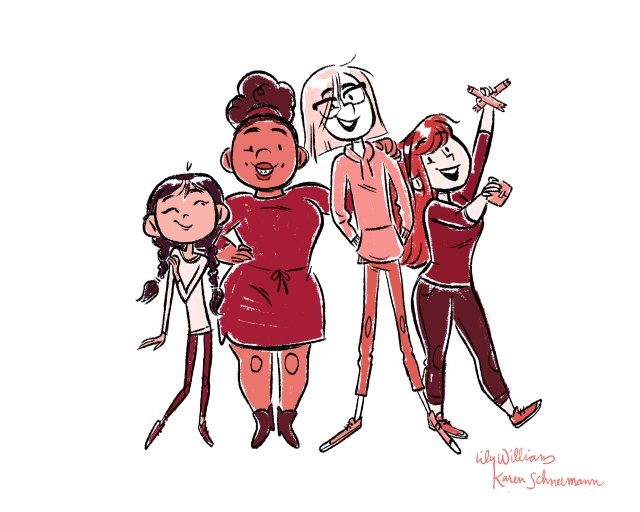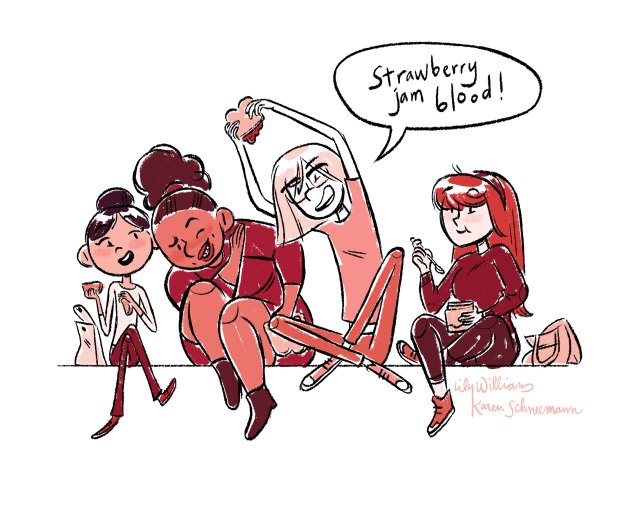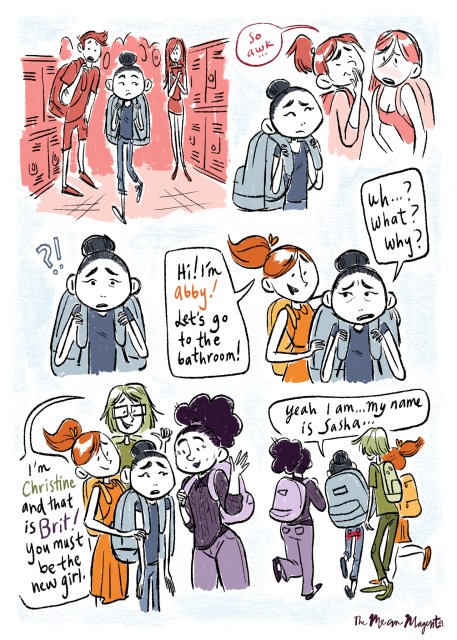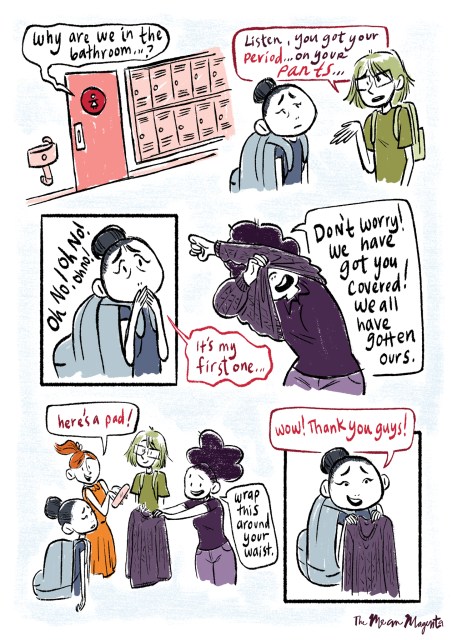I really care about women’s health and sexual education and making sure that people feel comfortable about talking and learning about both, and so I’m super excited to announce that First Second will be publishing the book Go With the Flow, a middle school graphic novel by Lily Williams and Karen Schneemann, co-creators of the online menstruation-themed comic The Mean Magenta, about getting your period. The book comes out in 2019, but I’m excited to share with you some preview illustrations and an interview with the creators. Menstruation is something that many girls, women, non-binary people and trans men deal with on a monthly basis, and it’s still swept under the rug and forcefully ignored by huge parts of American society, including the government.
First Second describes the book as a story about a group of friends who are fighting against their society’s refusal to treat their health as an important issue.
Best friends Sasha, Abby, Christine, and Brit are working their way through high school, navigating friendships, classes, first crushes, crushed expectations, and that pesky thing called a period. When Sasha gets her first period at school, friends Abby, Brit, and Christine rush to help only to discover that the school is out of products. On further investigation, they learn that the school, and none of the schools in the district, plan on restocking. Undeterred by the school’s lack of interest in female health, the girls come up with a period positive plan that quickly turns into a menstrual movement, threatening to turn their school lives and friendship into a bloody mess.
Mey: Right now women’s health is under attack from the government, can you talk about how the current political climate makes this book even more important?
Karen: For some reason women’s health issues traditionally seem to have been minimized. This may be due to a stigma around blood or female sexuality or just a general discomfort talking about these issues. Regardless of the reason, we can’t let women’s reproductive health get sidelined. This is especially true in this political climate when there is increased discussion regarding limiting reproductive rights and access to health care. All people should be aware of their own bodies: what is normal and what could be a sign of a bigger health problem so they can be their own best advocate when it comes to their health care. Nothing could be more important or more personal than your own body and we all need to realize how critical that is. One of the goals of this book is to encourage awareness of your own body and also to acknowledge that everyone’s experience is different.. No legislator should be making decisions which limit a person’s ability to make crucial decisions for their own well-being.
Lily: Body autonomy is incredibly important always, but more and more important as politicians want to close the gap on a person retaining the rights to make decisions about their own body. Menstruation is arguably the first step to this. It’s made clear when you go into any public bathroom and there is free toilet paper but no sanitary napkins, how tampons are taxed as “luxury items” in many states, or how birth control is constantly up for debate when many women use it as medication to regulate their periods, flow, hormone levels, ovarian cysts, endometriosis, and hormonal acne. However, these topics have been shoved into a box and considered a shameful thing to discuss. We cannot make any progress if we cannot even discuss periods. We are here to normalize period talk… and then we can go from there.
M: Your book looks fun, cute and accessible, why was it important for you to make it like that?
Lily: Thank you! Periods can be scary and can even sometimes be an emotional burden. Karen and I want to create a world centered around menstruation that feels anything but that. We feel it is important that people (of all ages) who menstruate can feel happy, supported, and encouraged to be empowered by their bodies and to accept their awesome selves.
Karen: We really wanted to make talking about periods an enjoyable experience. Fun characters in realistic situations with cute illustrations seems like the perfect way to show some likable role models talking about their bodily functions in a positive way. We definitely didn’t want to scare anyone away or bore them with dry textbook discussions. Our hope is that this book helps people feel more comfortable and realize that there’s a wide range of normal. If we can use our characters to normalize some of the crazy symptoms or situations that everyone thinks only happens to them, we can open up more conversations and help people to be less embarrassed about bringing issues up with their family, friends or doctor. Becoming more comfortable with your own body is the first step in taking control of your health.
M: If you could say one, quick thing to girls and other people who are getting their first period, what would it be?
Lily: Congratulations!! It’s pretty nuts to think about all the women who have menstruated before you throughout history… thank goodness we have better ways to deal with cramps now than our poor medieval menstruators!
Karen: Your body is capable of amazing things. Listen to it. Take care of yourself and share your experiences with others. Share stories, laugh and learn from each other.
New Releases (March 29)
Supergirl by Peter David Book 2 TP
Wonder Woman & The Justice League of America Vol 1 TP
Adventure Time Vol 9 Brain Robbers GN
Saban Power Rangers Aftershock Movie GN
Welcome to Drawn to Comics! From diary comics to superheroes, from webcomics to graphic novels – this is where we’ll be taking a look at comics by, featuring and for queer ladies. So whether you love to look at detailed personal accounts of other people’s lives, explore new and creative worlds, or you just love to see hot ladies in spandex, we’ve got something for you.
If you have a comic that you’d like to see me review, you can email me at mey [at] autostraddle [dot] com.







I’m a bit confused. Is the comic about any kid/teen getting their first period or about cis girls in particular? Every time Mey asked in a gender neutral fashion the interviewees responded in terms of feminine pronouns and all the characters have either female or gender neutral (I think) names.
A gender neutral book about periods which explained that a lot of people who have a vagina get a period would have been a great resource when I was a kid.
TW: blood, periods
(I’m afab bigender but I hadn’t heard of nb identities growing up. As a preteen I identified as a boy, I’m more over the masculine side of being nb so I hope it’s ok me still using the site. Anyway preteen stubborn boy me didn’t realise that ‘girls get periods’ was any different to any of the other multitude of things girls also stereotypically did so didn’t listen much to the whole periods talk at school then ended up bleeding between the legs just as much as most people born with vaginas do at a certain point in their lives. A book explaining that other genders get periods too would have really helped)
Yeah I changed my username. Long story, I thought it was a place for putting our real name rather than an internet type name. I liked having it out there somewhere but I didn’t like it on its own when I saw it was on all our comments so I put some stuff by it to make it more like a username for an internet website.
It’s my name from when I was a kid except that my mum stopped me using it during puberty (I think in case of bullying and in case it ended up with me being not straight… both of those didn’t work) so I stopped using it and now I’m coming out as bigender and discovering what it means for me to be nb and that that’s a ‘thing’ I decided to go back to using it in some capacity.
yeah I agree. A book that includes characters of several genders would be ideal, especially including a trans boy character. From the title of the article it sounded like that’s what this book is supposed to be but … after reading the whole thing I’m not so sure :/ Also the comment about “thinking about all the women who menstruated before you” weirded me out
I guess it will be inclusive: see http://themeanmagenta.com/post/152411378247/christine-tells-a-spooky-story-for-halloween (besides – soooo many great mini-comics on their site!!)
But tbh the majority of menstruating people are women.
Yeah that’s true but not everyone female does and not everyone who does is female. Even with cis women, some girls can’t have periods because of disabilities or being undernourished or stress (I guess that falls under disabilities). So much has been written at this point about girls’ first period that a fresh take on it would be welcome (even if, as mentioned below, it was ‘periods actually suck but you have them because you were born with a vagina. Here’s how to cope’ rather than a celebration of feminine maturity)
Especially since kids are getting periods earlier and earlier these days and it feels iffy saying to an eight year old ‘welcome to womanhood’ even if she’s a girl.
Wanted to have included this link: http://themeanmagenta.com/post/153920365587
shradha, it does talk about cups, too… sometimes (although mainly disposable stuff, grmpf).
Sorry, I sound like a fangirl! I didn’t know the site before, but now I like it a lot!
So on board with this except for the “making periods an enjoyable experience.” More like “you may spend a quarter of your childbearing years gobbling so much ibuprofen you worry about your liver in order to function as a person in the world.” But of course, that’s just my experience ;-)
Yes, I love what they’re doing but I thought the same about that bit! For some of us it will always be a horrible experience. Great that they’re trying to raise awareness around conditions like endometriosis.
QUEER GIRL, never before has anyone summed up my lifetime of period experiences so succinctly.
That’s what I thought too cause I hate the idea that we should all be positive about our periods – but I read it again and I think they’re more about wanting to make talking about periods easier/more enjoyable, which is so important.
Wow, the art is SUPER adorable.
Those last panels were really nice. That’s super sweet to help out the new girl like that
riiight?? So sweet <3
This looks great, thanks for writing about it!
hello! amazing effort. conventional sanitary napkins and tampons additionally are also a health and environmental hazard with all the toxic elements it is made of, some often with a direct link to endometriosis or toxic shock syndrome. would be nice if the panel also included healthier alternatives :)
I like how they’re trying for diversity of menstrual experiences, but I also wish they covered that internal menstrual products aren’t for everyone. Lots of people who menstruate are really uncomfortable with having anything inside them for various reasons (dysphoria, disabilities/illnesses/anatomical variations that make having something in your vagina more or less comfortable, trauma, just not liking it), and it’s perfectly okay for them to use external products instead.
Like, as a nonbinary person who menstruates, I do wish there was a nonbinary kid and/or a trans boy in the cast – but I’m not sure how much that would’ve helped me if I was at an age where I would’ve be reading something like this, because I wouldn’t have yet known that applied to me (and neither would a lot of future trans people – some people known when they’re 12, but very many people don’t). But even more than that, I think it’s more important to normalize experiences that are common to trans people, but common in general, too.
Oh my goodness, this is precious. I wish I’d had this instead of my mom telling me I’d “become a woman” as a young tween and handing me a box of tampons with no further instructions. Then there was my dad avoiding eye contact for a good week, until he and my mom sat me down and gave me a book about Christian sanctity and a purity ring to remind me to save myself until marriage.
Needless to say, little gay me was very confused. I’m intersex and fairly androgynous, and all the “you’re a woman now” stuff coupled with suddenly having an F-cup chest on a 5’4″, 110-lb frame made my teenage years a swirling haze of dysphoria. I didn’t have a name for it until college, though, when I finally got un-monitored internet access and joined my campus Pride group. Hearing the word nonbinary and learning that not everyone who gets periods is a woman was an epiphany.
I just really appreciate the (mostly) gender-neutral language, that they have an androgynous-looking character, and that they treat periods as a normal bodily function and not some ritualistic to-do. It seems like a good book and I hope it helps kids get through this inconvenient, frightening, and painful experience.